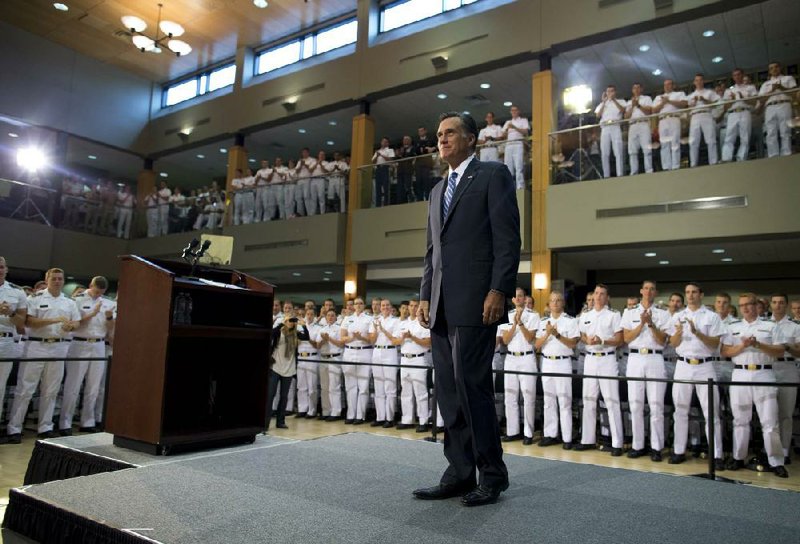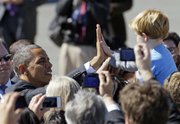LEXINGTON, Va. — Mitt Romney declared Monday that the U.S. must join other nations in helping arm Syrian rebels to oust Syrian President Bashar Assad, casting President Barack Obama’s efforts as weak and part of a broader lack of leadership in the Middle East and around the globe.
Hoping to bolster his own foreign-policy credentials, the Republican presidential challenger said he would identify and organize those in the Syrian opposition who share American values, then work with American allies to “ensure they obtain the arms they need to defeat Assad’s tanks, helicopters and fighter jets.”
“It is essential that we develop influence with those forces in Syria that will one day lead a country that sits at the heart of the Middle East,” Romney said.
In a wide-ranging address at the Virginia Military Institute, Romney criticized Obama’s policies toward Iraq, Afghanistan, Iran and Israel.
Nowhere did he emphasize a different course as strongly as in Syria. Romney cast the civil war there as a proxy conflict with Iran and said it’s in America’s interest to court an opposition likely to play a key role in leading a future Syria.
Activists say more than 32,000 people have died in Syria’s conflict, which began 19 months ago with Assad’s government cracking down on protests. That crackdown was followed by armed rebellion in many parts of the country and, eventually, a full-scale civil war.
Obama’s administration still seeks a peaceful political transition, even though the president acknowledged in August that the likelihood of a soft landing for the conflict “seems pretty distant.”
Romney aides said he wasn’t calling for the U.S. to directly arm the rebels.
Nor has Obama. The president’s re-election campaign dismissed Romney’s remarks as “saber-rattling” and accused the Republican of refusing to outline just how his policies would differ from the incumbent’s.
RELATED ARTICLE
http://www.arkansas…">Syria sneers at Turkey’s past
The administration has been quietly coordinating with partners in the region who want to provide military assistance. But Obama has opposed directly providing weapons to the rebels or using U.S. air power to prevent Syrian jets from flying.
The U.S. role in coordination is currently aimed at maintaining some measure of control over which groups receive weapons. Administration officials have been pressing America’s Arab allies for months about the danger of equipment such as shoulder launched rockets and other heavy weaponry falling into the wrong hands. The official line is that any arms assistance to the rebels only further militarizes a conflict that should be solved through a peaceful transition strategy.
The head of the Turkey based Syrian National Council, the main Syrian opposition group, said Romney’s comments were the “right statement.” Abdelbaset Sieda said he was not disappointed in the U.S. president, but added that “Obama must do more to stop the killing.”
On another international topic, Romney said he wouldn’t allow Russian President Vladimir Putin any “flexibility,” a dig at Obama, who was caught on a microphone telling then-President Dmitry Medvedev last March that the U.S. would have more flexibility to work on missile-defense issues after the election.
He also belittled Obama as “leading from behind” in conflict spots across the Middle East. Acknowledging that Obama deserves credit for killing Osama bin Laden, he nonetheless criticized the president as lacking a comprehensive counter terrorism policy and failing to capitalize on the Arab Spring uprisings.
He called for tougher sanctions on Iran than those that exist, though he did not say how he would strengthen them. He said he would condition aid to Egypt on continued support for its peace treaty with neighboring Israel. Current law includes such a condition.
Romney criticized Obama for a “politically timed retreat” from Afghanistan, but said he would maintain the same 2014 deadline the president has set for the pullout of U.S. troops and the transition to Afghan security forces.
The Republican nominee also emphasized his commitment to a two-state solution for peace between the Israelis and Palestinians, a process he dismissed during a secretly videotaped fundraiser in May. He also criticized the administration for its handling of the attacks in Benghazi, Libya.
The assault on the diplomatic mission in Benghazi “cannot be blamed on a reprehensible video insulting Islam, despite the administration’s attempts to convince us of that for so long,” Romney said. “No, as the administration has finally conceded, these attacks were the deliberate work of terrorists who use violence to impose their dark ideology on others.”
During his speech, Romney also relied on a narrow distinction to fault Obama for not signing any “new” free-trade agreement in the past four years. “I will reverse that failure,” he said.
Almost one year ago, on Oct. 21, 2011, Obama signed into law free-trade agreements with South Korea, Colombia and Panama. While he signed the legislation to ratify the accords, which had been stalled in Congress for four years, it was President George W. Bush who initiated the deals and signed the agreements with the U.S. trading partners.
GET-OUT-THE-VOTE PUSH
As the White House race shows signs of tightening nationally, Obama’s campaign is banking on an extensive get out-the-vote operation and state-by-state shades of economic improvement to court voters in battleground states.
The president has more get-out-the-vote offices than Romney in every competitive state, some of which never closed after the 2008 campaign. Democrats said that network helped them register more than 130,000 new voters - most in battleground states in the week before the debate. There are more registered Democrats than Republicans in nearly every competitive state with party registration.
Democrats have an edge in Iowa, where 62 percent of the 111,000 voters who have cast absentee ballots so far were registered Democrats. Twenty percent were Republicans and 18 percent were unaffiliated, according to the Iowa secretary of state’s office.
In Ohio, a perennial battleground state, Democrats have an edge over Republicans among people who have requested absentee ballots, though relatively few completed ballots have been submitted. Among the 691,000 people who have requested absentee ballots in 49 of the state’s 88 counties, 30 percent are Democrats and 24 percent are Republicans. Forty-six percent are unaffiliated voters, according to data collected by the AP.
Meanwhile, the National Rifle Association has begun airing a new television ad in Ohio and three other battleground state surging voters to defeat Obama. The pro-gun-rights group is spending $1.3 million to air the ad in Ohio, Florida, Virginia and Wisconsin.
The ad suggests Obama is “attacking our Second Amendment rights” and says a vote against the Democrat would help “defend freedom.” A spokesman said the group will be on the air with ads through election day Nov. 6.
RYAN, BIDEN GEAR UP
Republican vice presidential candidate Paul Ryan made his first trip to Ohio in the past three weeks Monday, telling supporters there that if elected, Romney’s administration would immediately approve an oil pipeline that would run from Canada to U.S. refineries in Texas, creating thousands of jobs and pushing America on its way to energy independence
“We need to unlock the energy we have in this country to create jobs,” he said.
He blamed Obama for standing in the way of the Keystone XL pipeline and pushing too many environmental regulations that have cost jobs in the coal industry, a thorny issue for the president in southeast Ohio, where coal has a large footprint.
Ryan is to debate Vice President Joe Biden on Thursday, the only match up between the two before the election.
Obama and Romney will face off again Oct. 16 in Hempstead, N.Y., in a town-hall-style debate.
Meanwhile, the children’s’ TV channel Nickelodeon said Romney skipped the chance to take part in a “Kids Pick the President” special that includes his opponent. The program includes videotaped questions for the candidates from children nationwide. Afterward, viewers can vote for their pick for president.
Linda Ellerbee, the show’s host and producer, said candidates show “respect for kids” by answering their questions and called Romney’s decision disappointing. The Romney campaign did not immediately respond to phone and e-mail requests for comment.
In the Nickelodeon special, Obama is asked about issues including jobs, immigration and bullying. It debuts Oct. 15.
Information for this article was contributed by Kasie Hunt, Steve Peoples, Ben Feller, Karin Laub, Bradley Klapper, Julie Pace, Stephen Ohlemacher, Ken Thomas, Nedra Pickler, Jim Kuhnhenn, John Seewer and staff members of The Associated Press; by Trip Gabriel of The New York Times; and by Julianna Goldman of Bloomberg News.
Front Section, Pages 1 on 10/09/2012



